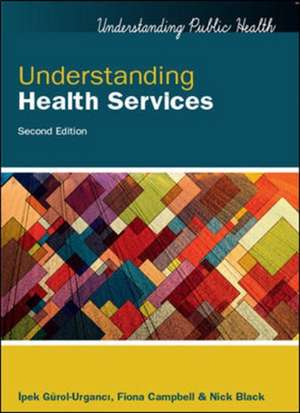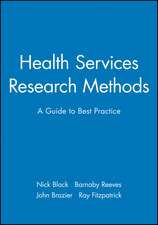Understanding Health Services
Autor Ipek Gurol-Urganci, Fiona Campbell, Nick Blacken Limba Engleză Paperback – 24 iul 2017
Helping to determine what influences and shapes health services, it also examines some of the key processes involved in providing healthcare, considering three levels: individual patients, health care organizations such as hospitals, and regional or national institutions such as governments.
This second edition has been updated to include recent developments and further examples and activities from low, middle and high income countries.
The book examines:
• how medical knowledge, staff, patients and finance shape health services
• what factors influence utilization of health services
• the roles played by users of health services
• how to define and measure outcomes and assess performance
• how practice and policy can be changed to improve the quality of health care
Understanding Health Services, 2nd Edition is an essential resource for students of public health and health policy, researchers, public health practitioners and policy makers.
Understanding Public Health is an innovative series published by Open University Press in collaboration with the London School of Hygiene & Tropical Medicine, where it is used as a key learning resource for postgraduate programmes. It provides self-directed learning covering the major issues in public health affecting low, middle and high income countries.
"This excellent book provides an ideal background to understanding how health services work and how they can be studied. Not tied to any particular country, it includes key chapters on how health services have developed and are organised, need and demand, the role of health professionals, and measuring and improving quality of care. The book is ideal reading for students on Masters courses in public health and related subjects from high-, middle- and low-income countries and includes learning objectives and exercises in each chapter which can be completed individually or used for discussion. Strongly recommended."
Martin Roland, Emeritus Professor of Health Services Research, University of Cambridge, UK
"Health services are central to attaining high levels of population health and providing those services consumes a substantial share of our financial resources. This book provides a splendid introduction to many of the key building blocks including medical knowledge and other key inputs, payment and other factors that influence utilization, and in turn quality of care and outcomes. The learning objectives are a wonderful aid for self-directed learning as are the directed activities and feedback, the text is lucid and the main concepts are very easy to access. This is a great book for someone looking to develop a broad understanding of health services. I will be surprised if it does not become a classic. It will surely be at the top of my list of recommended readings for my own students."
Arnold M Epstein, John H Foster Professor and Chair, Department of Health Policy and Management, Harvard School of Public Health, USA
Preț: 294.82 lei
Nou
Puncte Express: 442
Preț estimativ în valută:
56.41€ • 59.05$ • 46.95£
56.41€ • 59.05$ • 46.95£
Carte tipărită la comandă
Livrare economică 31 martie-14 aprilie
Preluare comenzi: 021 569.72.76
Specificații
ISBN-13: 9780335262144
ISBN-10: 0335262147
Pagini: 280
Dimensiuni: 171 x 241 x 17 mm
Greutate: 0.44 kg
Ediția:2
Editura: McGraw Hill Education
Colecția Open University Press
Locul publicării:United Kingdom
ISBN-10: 0335262147
Pagini: 280
Dimensiuni: 171 x 241 x 17 mm
Greutate: 0.44 kg
Ediția:2
Editura: McGraw Hill Education
Colecția Open University Press
Locul publicării:United Kingdom
Cuprins
Section 1: Introduction
1 A systems approach to health services
2 Formal and lay care
Section 2: Inputs to health care
3 Diseases and medical knowledge
4 Medical paradigms
5 Health care professionals
6 Funding health care
Section 3: Processes of health care
7 Need, demand and use
8 Users of health care
9 Paying providers
Section 4: Outcomes and quality of health care
10 Quality of health services
11 Defining quality
12 Quality assessment
13 Quality improvement
1 A systems approach to health services
2 Formal and lay care
Section 2: Inputs to health care
3 Diseases and medical knowledge
4 Medical paradigms
5 Health care professionals
6 Funding health care
Section 3: Processes of health care
7 Need, demand and use
8 Users of health care
9 Paying providers
Section 4: Outcomes and quality of health care
10 Quality of health services
11 Defining quality
12 Quality assessment
13 Quality improvement











